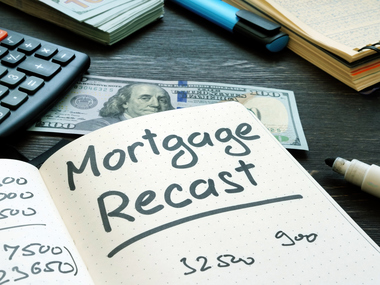
When paying your mortgage each month, a portion of your payment goes toward reducing your loan's principal balance while another portion goes toward paying interest. A share of your payment will typically go toward paying for the costs of property taxes and homeowners insurance too.
If you want to pay off your mortgage faster and without paying as much in interest, your strategy should be reducing its principal balance quicker.
You can do this with a mortgage recast.
What is a recast?
If you have extra money, you can make a large lump-sum payment on your mortgage loan's principal balance. This will reduce the amount you owe on your loan and the amount of interest your lender will charge. However, since it's the same mortgage, you can skip some steps that a refinance would involve. For example, there's no credit check or appraisal needed.
After you make the sizable payment, your lender will recast, or rework, your mortgage. This might result in a lower monthly payment and will also reduce the amount of interest you'll pay on your loan over time. That's because the lower your principal balance, the less interest it will accumulate.
When you recast your mortgage, its term and interest rate won't change. But because your principal balance is lower, your monthly payment and the amount of interest you pay over time will most likely decrease.
Recasting a mortgage isn't an option for everyone. But maybe you've received a substantial sum of money, e.g., an inheritance or a large bonus from your employer. Maybe you've earned a large amount of money from a royalty payment. If you have this extra money, you can spend it on reducing your mortgage's principal balance.
The challenges
There are some challenges to consider when recasting your mortgage.
First, you'll need a large enough sum of money to close a recast. This will vary, but you'll typically need a minimum of $10,000 to put toward it. Check with your lender on how much you'll need to recast your home loan.
Second, you'll probably have to pay a fee. Many lenders charge for recasting a mortgage. This isn't surprising: Recasting your loan, including calculating your new monthly payment, takes work. This fee will vary, but you can expect to pay about $250 for a recast. That's significantly lower than what'd you pay for a mortgage refinance.
You also need to have the right kind of loan. You can't recast a loan insured by a government agency. This means that you can't recast Federal Housing Administration, Veterans Affairs or United States Department of Agriculture loans. You can, however, recast a conventional mortgage, i.e., one not insured by any government body.
Most lenders will also require that you have a certain amount of equity in your home before they approve you for a recast. Equity is the difference between what you owe on your mortgage and how much your home is worth. If your home is worth $300,000 and you owe $150,000 on your mortgage, you have $150,000 in equity. How much equity you'll need depends on your lender.
If you can overcome these hurdles, then a recast might be a smart financial move for you. But what if you don't have a large sum of money to devote to paying down your principal balance? You can always opt instead for a refinance, which might leave you with both a lower mortgage payment and a lower interest rate. Talk with your lender to find out the best financial move for your situation.







Comments (0)
Be the first to comment on this post!
Post a Comment